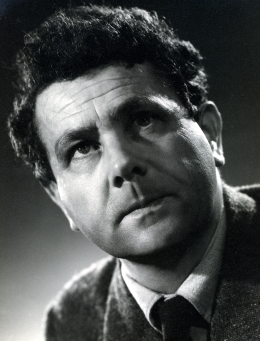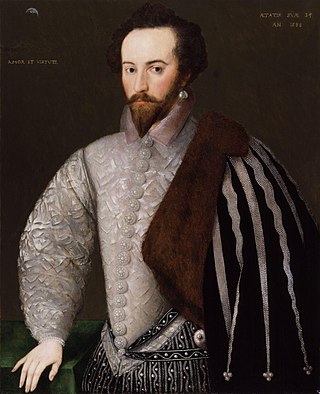Related Research Articles
"Land of Hope and Glory" is a British patriotic song, with music by Edward Elgar, written in 1901 and with lyrics by A. C. Benson later added in 1902.

Gerald Raphael Finzi was a British composer. Finzi is best known as a choral composer, but also wrote in other genres. Large-scale compositions by Finzi include the cantata Dies natalis for solo voice and string orchestra, and his concertos for cello and clarinet.

The Finlandia hymn refers to a serene hymn-like section of the patriotic symphonic poem Finlandia, written in 1899 and 1900 by the Finnish composer Jean Sibelius. It was later re-worked by the composer into a stand-alone piece. With words written in 1940 by Veikko Antero Koskenniemi, it is one of the most important national songs of Finland. Although not the official national anthem of Finland, it has been continuously proposed as such.

The epiclesis refers to the invocation of one or several gods. In ancient Greek religion, the epiclesis was the epithet used as the surname given to a deity in religious contexts. The term was borrowed into the Christian tradition, where it designates the part of the Anaphora by which the priest invokes the Holy Spirit upon the Eucharistic bread and wine in some Christian churches. In most Eastern Christian traditions, the Epiclesis comes after the Anamnesis ; in the Western Rite it usually precedes. In the historic practice of the Western Christian Churches, the consecration is effected at the Words of Institution though during the rise of the Liturgical Movement, many denominations introduced an explicit epiclesis in their liturgies.

Vande Mataram is a poem written in Sanskrit and Sanskritised Bengali by Bankim Chandra Chatterjee in the 1870s. The first two verses of the poem were adopted as the National Song of India in October 1937 by the Congress.
Richard Crashaw was an English poet, teacher, High Church Anglican cleric and Roman Catholic convert, who was one of the major metaphysical poets in 17th-century English literature.
"I Vow to Thee, My Country" is a British patriotic hymn, created in 1921 when music by Gustav Holst had a poem by Sir Cecil Spring Rice set to it. The music originated as a wordless melody, which Holst later named "Thaxted", taken from the "Jupiter" movement of Holst's 1917 suite The Planets.

Consecration is the transfer of a person or a thing to the sacred sphere for a special purpose or service. The word consecration literally means "association with the sacred". Persons, places, or things can be consecrated, and the term is used in various ways by different groups. The origin of the word comes from the Latin stem consecrat, which means dedicated, devoted, and sacred. A synonym for consecration is sanctification; its antonym is desecration.

A troparion in Byzantine music and in the religious music of Eastern Orthodox Christianity is a short hymn of one stanza, or organised in more complex forms as series of stanzas.

In English literature, The Nymph’s Reply to the Shepherd (1600), by Walter Raleigh, is a poem that responds to and parodies the poem “The Passionate Shepherd to His Love” (1599), by Christopher Marlowe. In her reply to the shepherd’s courtship, the nymph presents a point-by-point rejection of his offer of a transitory life of passion and pastoral idyll.

A grace is a short prayer or thankful phrase said before or after eating. The term most commonly refers to Christian traditions. Some traditions hold that grace and thanksgiving imparts a blessing which sanctifies the meal. In English, reciting such a prayer is sometimes referred to as "saying grace". The term comes from the Ecclesiastical Latin phrase gratiarum actio, "act of thanks." Theologically, the act of saying grace is derived from the Bible, in which Jesus and Saint Paul pray before meals. The practice reflects the belief that humans should thank God who is believed to be the origin of everything.

A Christian child's prayer is Christian prayer recited primarily by children that is typically short, rhyming, or has a memorable tune. It is usually said before bedtime, to give thanks for a meal, or as a nursery rhyme. Many of these prayers are either quotes from the Bible, or set traditional texts.

"Recessional" is a poem by Rudyard Kipling. It was composed for the Diamond Jubilee of Queen Victoria, in 1897.

Thanksgiving after Communion is a spiritual practice among Christians who believe in the Real Presence of Jesus Christ in the Communion bread, maintaining themselves in prayer for some time to thank God and especially listening in their hearts for guidance from their Divine guest. This practice was and is highly recommended by saints, theologians, and Doctors of the Church.

Catholic tradition and Mariology include specific prayers and devotions as acts of reparation for insults and blasphemies against Mary, mother of Jesus, often known as the Blessed Virgin Mary to Catholics. Similar prayers as Acts of Reparation to Jesus Christ and Acts of Reparation to The Holy Trinity also exist.

The alma mater of the University of Pittsburgh was adopted soon after the University changed its name in 1908 from the Western University of Pennsylvania to its current moniker. Lyrics were written by George M. P. Baird, class of 1909 and were set to the tune of what was then the Austrian National Anthem. A new tune for the "Alma Mater" hymn was composed by Charles W. Scovel, class of 1883, but it was not widely adopted and was either lost or became obscure.
Psalm 86 is the 86th psalm of the Book of Psalms, beginning in English in the King James Version: "Bow down thine ear, O Lord, hear me: for I am poor and needy". In the slightly different numbering system used in the Greek Septuagint and Latin Vulgate translations of the Bible, this psalm is Psalm 85. In Latin, it is known as "Inclina Domine". It is attributed to David.

Spiritual communion is a Christian practice of desiring union with Jesus Christ in the Eucharist. It is used as a preparation for Mass and by individuals who cannot receive holy communion.

Sing Unto God, is an anthem composed by George Frideric Handel. It was performed for the royal wedding on 27 April 1736 at the Chapel Royal in St James's Palace, London with Francesca Cuzzoni-Sandoni, Carlo Broschi "Farinelli", and Francesco Bernardi "Senesino". The text was adapted from verses of Psalms 68, 106 and 128.
"On the Death of Mr. Crashaw" is an elegy by English poet Abraham Cowley in commemoration of his friend Richard Crashaw's death. First published in 1656, it is considered by literary critics as one of Cowley's greatest poems.
References
- ↑ Webster, Peter (2017). Church and patronage in 20th century Britain : Walter Hussey and the arts. London: Palgrave Macmillan. pp. 90–93. ISBN 9781137369093. OCLC 1012344270.
- Banfield, Stephen. Gerald Finzi: An English Composer. London: Faber and Faber, 1998.
- Crashaw, Richard. Steps to the Temple: Delights of the Muses and Other Poems. Edited by A. R. Waller. Cambridge UK: Cambridge University Press, 1904.
- Finzi, Gerald. Lo, the full, final sacrifice. London: Boosey & Co., Ltd., 1946.